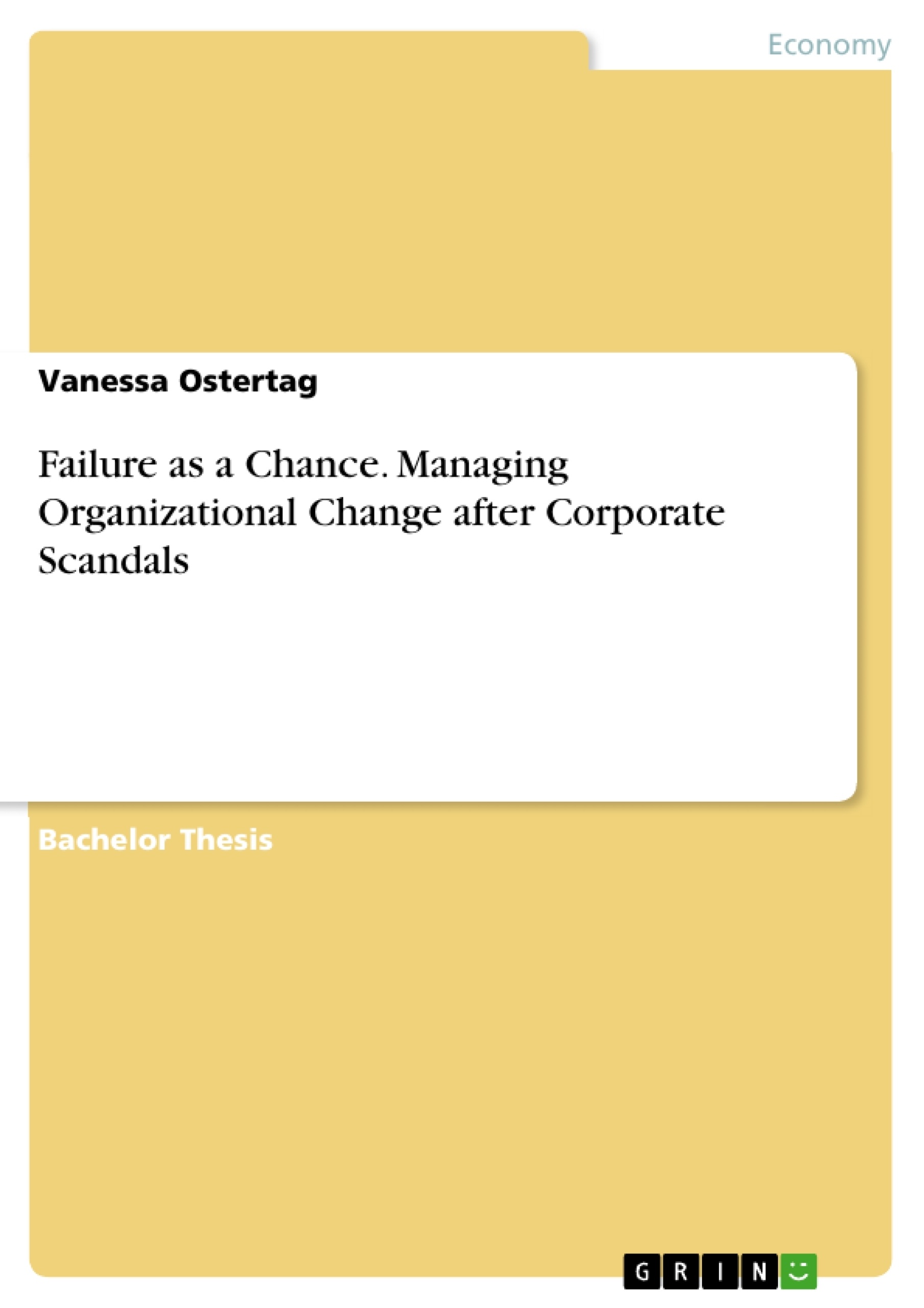
Failure as a Chance. Managing Organizational Change after Corporate Scandals
Bachelorarbeit, 2014
39 Seiten, Note: 1.0
Leseprobe
Inhaltsverzeichnis (Table of Contents)
- Introduction
- Corporate Scandals
- The Scandal’s Internal Antecedents
- The Effects of Corporate Scandals
- The Siemens Bribery Scandal
- The Direct Response to a Corporate Scandal
- Organizational Change after a Corporate Scandal
- Derivation of a Change Management Approach
- An Integrated Framework
- Change Management and Sustainable Improvement
- Conclusion
- Limitations and Future Research
Zielsetzung und Themenschwerpunkte (Objectives and Key Themes)
This paper examines how organizations can successfully manage change after facing a corporate scandal. It combines the literature on crisis management, which focuses on improving perceptions of the organization and the underlying scandal situation, with the literature on change management, which is decisive in constructing the appropriate change implementation. The paper argues that an integrated approach is necessary to develop a method for managing change after corporate scandals.
- The origins and internal antecedents of corporate scandals
- The effects of corporate scandals on organizational legitimacy, reputation, and performance
- The importance of a responsible and proactive short-term response to a corporate scandal
- An integrated framework for managing organizational change after a corporate scandal
- The role of leadership, communication, and employee involvement in driving successful change
Zusammenfassung der Kapitel (Chapter Summaries)
The introduction provides background information on the growing phenomenon of corporate scandals and their potential impact on organizations. It argues that such scandals, while damaging, also present opportunities for organizational change. The chapter then introduces the Siemens bribery scandal as a case study, highlighting its significant impact on the company's reputation and its subsequent efforts to address the issues.
Chapter 2 explores the concept of corporate scandals, defining them as human-caused, self-inflicted corporate failures that become publicly known and threaten organizational reputation, legitimacy, and performance. The chapter discusses the internal antecedents of scandals, examining both individual-level factors such as "bad apples" and organizational-level factors such as corporate culture, structures, and strategies. It concludes by outlining the significant negative effects of corporate scandals on organizations, their stakeholders, and their employees.
Chapter 3 examines the direct response to a corporate scandal, emphasizing the importance of honest communication and proactive action. The chapter discusses the identification of key stakeholders and their expectations, as well as the importance of offering a public apology, demonstrating remorse, and taking corrective action. The chapter then uses the Siemens case study to illustrate how organizations can implement a proactive response by cooperating with authorities, conducting independent investigations, and offering amnesty programs to encourage transparency and accountability.
Chapter 4 delves into the crucial process of managing organizational change after a corporate scandal. The chapter discusses the need for a combined approach that encompasses both planned and emergent change strategies, recognizing the urgency of the situation and the need for fundamental shifts in organizational culture. The chapter then presents a detailed framework for managing scandal-induced change, outlining specific steps and considerations for interacting with both employees and outside stakeholders. It emphasizes the role of credible change leadership, clear communication, and the development of a compelling vision.
The chapter then explores the critical elements of organizational change, including the establishment of a change coalition, the definition of strategic goals, and the alignment of organizational architecture. It highlights the importance of educating and empowering employees to embrace the new values and practices through training, mentorship, and two-way communication. The chapter concludes by discussing the importance of monitoring progress, recognizing achievements, and establishing a culture of continuous improvement to sustain long-term change.
Schlüsselwörter (Keywords)
This preview focuses on the management of organizational change after corporate scandals, incorporating aspects of crisis management, change leadership, and stakeholder engagement. The core concepts include organizational culture, corporate responsibility, reputation repair, and the development of a culture of integrity. The case study of the Siemens bribery scandal serves as a practical illustration of how organizations can navigate the complexities of change following a significant ethical lapse.
Details
- Titel
- Failure as a Chance. Managing Organizational Change after Corporate Scandals
- Hochschule
- Ludwig-Maximilians-Universität München
- Note
- 1.0
- Autor
- Vanessa Ostertag (Autor:in)
- Erscheinungsjahr
- 2014
- Seiten
- 39
- Katalognummer
- V450747
- ISBN (eBook)
- 9783668860711
- ISBN (Buch)
- 9783668860728
- Sprache
- Englisch
- Schlagworte
- corporate scandals scandals Korruption Siemens Korruptionsskandal organizational change Unternehmenswandel Change Management Unternehmensskandal organizational crisis Unternehmenskrise crisis management Krisenmanagement stakeholder management corporate credibility
- Produktsicherheit
- GRIN Publishing GmbH
- Preis (Ebook)
- US$ 17,99
- Preis (Book)
- US$ 19,99
- Arbeit zitieren
- Vanessa Ostertag (Autor:in), 2014, Failure as a Chance. Managing Organizational Change after Corporate Scandals, München, Page::Imprint:: GRINVerlagOHG, https://www.diplomarbeiten24.de/document/450747
- Autor werden
- Ihre Optionen
- Vertriebskanäle
- Premium Services
- Autorenprofil
- Textarten und Formate
- Services für Verlage, Hochschulen, Unternehmen

- © GRIN Publishing GmbH.
- Alle Inhalte urheberrechtlich geschützt. Kopieren und verbreiten untersagt.
- info@grin.com
- AGB
- Open Publishing
Der GRIN Verlag hat sich seit 1998 auf die Veröffentlichung akademischer eBooks und Bücher spezialisiert. Der GRIN Verlag steht damit als erstes Unternehmen für User Generated Quality Content. Die Verlagsseiten GRIN.com, Hausarbeiten.de und Diplomarbeiten24 bieten für Hochschullehrer, Absolventen und Studenten die ideale Plattform, wissenschaftliche Texte wie Hausarbeiten, Referate, Bachelorarbeiten, Masterarbeiten, Diplomarbeiten, Dissertationen und wissenschaftliche Aufsätze einem breiten Publikum zu präsentieren.
Kostenfreie Veröffentlichung: Hausarbeit, Bachelorarbeit, Diplomarbeit, Dissertation, Masterarbeit, Interpretation oder Referat jetzt veröffentlichen!
- GRIN Verlag GmbH
-
- Nymphenburger Str. 86
- 80636
- Munich, Deutschland
- +49 89-550559-0
- +49 89-550559-10
- info@grin.com
-









